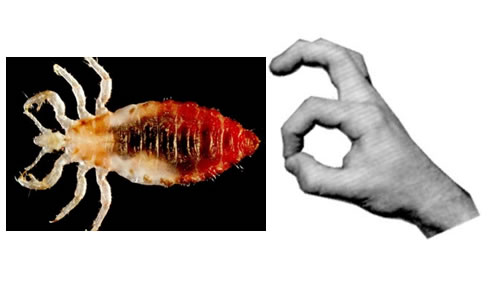 |
Amadete kabiri keta enda. (Saamia) Vidole viwili huuwa chawa. (Kiswahili) Deux doigts peuvent tuer le pou. (French) Two fingers killed a louse. (English) |
Saamia (Kenya and Uganda) Proverb
Background, Explanation, History, Meaning and Everyday Use
The Saamia speaking people live in Western Kenya and Eastern Uganda. They are composed of several clans. They predominantly inhabit the Kenya–Uganda border region of Busia. In Kenya, the Saamia speak a dialect similar to that of the Luhya tribe. However, on the Ugandan side there is a slight variation in the dialect spoken by the Saamia of Southern Busia on the shores of Lake Victoria, and those of North Busia. Their ancient economic activities included fishing in Lake Victoria and in rivers such as River Sio, crop farming (ovurimi), and livestock keeping (ovutuki).
The Saamia people love music. Music forms part of their various ceremonies, including marriages (obugole/obweya), wrestling (amalengo) and funerals. Their musical instruments include: Adungu, a large violin-like wooden instrument; Engalabe, a drum covered at one end with the skin of a monitor lizard; Erere, a flute; and, Sikudi. The major traditional dances are owaro, ekworo, eboodi and esikudi. The eboodi and ekworo are love dances. Owaro and esikudi are performed during happy times.
The Saamia taught their culture to children during a story-telling time in the evenings as they had their meals. The elders and parents transmitted the traditional community norms by telling stories infused with riddles, proverbs and wise sayings.
This proverb traces its origin to the Saamia communal way of life. Irrespective of their diversity in age and status, the people lived together and carried out most of their activities collectively. These included weeding, organizing traditional weddings and burial ceremonies among other social activities. This proverb was used to teach the community that unity is strength that also implied that success in all the community’s activities was guaranteed if members undertook a united approach. The proverb was also used to help eliminate individualism in the community.
One of the most common proverbs in African languages with many variations:
Two ants do not fail to pull one grasshopper.
Two eyes see better than one.
No matter how big an eye is, two eyes are better than one (together, we can do more).
Two fingernails kill a louse.
Two hands wash each other.
Biblical Parallels
- Ecclesiastes 4:9-12:“Two are better than one, because they have a good reward for their labor. For if they fall, one will lift up his companion. But woe to him who is alone when he falls. For he has no one to help him up. Again, if two lie down together, they will keep warm; but how can one be warm alone? Though one may be overpowered by another, two can withstand him. And a threefold cord is not quickly broken.’’
- Nehemiah 6:15: “So the wall was completed on the twenty-fifth of Elul, in fifty two days.” The amazing accomplishment according to this verse is the fact that it took the people only 52 days to rebuild the wall around Jerusalem. One significant thing Nehemiah, Chapter 3 tells us is the great number of people that were working on the wall. We are also told of the immensity of the work at hand — Jerusalem was not a small village, but a large city covering a substantial area. It is by everyone working diligently together that the work got done. This affirms the principle that working together lightens the burden of the work God has for us. Burdens become lighter when people work together.
Contemporary Use and Religious Application
Work gets done faster when people do it together, because there is strength in unity. For instance, two people in a combined effort can mow a lawn twice as fast as a single person can. The importance of working together is vividly shown in the book of Nehemiah that is also the case in ministry today. It is not only about how quickly people can put up chairs after a church social function, but also about the vital and eternally significant work that the church is here to do. How quickly and effective can visitation, evangelism, ministering to the needs of others, and other such work be done when we all work together? The church has a lot of work to be accomplished, but that work might not ever get done, given the rate we are doing it. In essence, we would do the things that God by His Spirit has equipped us to do, in a much faster and better way, if we all stepped out and did them together.
Each person’s work is important. So is the work of the church, and all the work that we do in the service of God Almighty. Sometimes the work we do might seem insignificant or trivial, but there is a huge purpose in it for it can have eternal consequences. And we can do it better together.
A good African proverb for growing Small Christian Communities (SCCs).
Gabriel Odhiambo
P. O. Box 3897
00200 Nairobi, Kenya
Cellphone: 0726-369593
Email: gabrielodhiambo1@gmail.com
Edited by Ben Chebweche Mabuto
Kenya, Nairobi
Cellphone: +245 720 994 093
Email: bmabutoz@gmail.com
Photographs provided by:
Cephas Yao Agbemenu
Department of Fine Art and Design
Kenyatta University
P.O. Box 43844
Nairobi, Kenya
Cellphone: +254 723-307992
Email: cyagbemenu@yahoo.com

